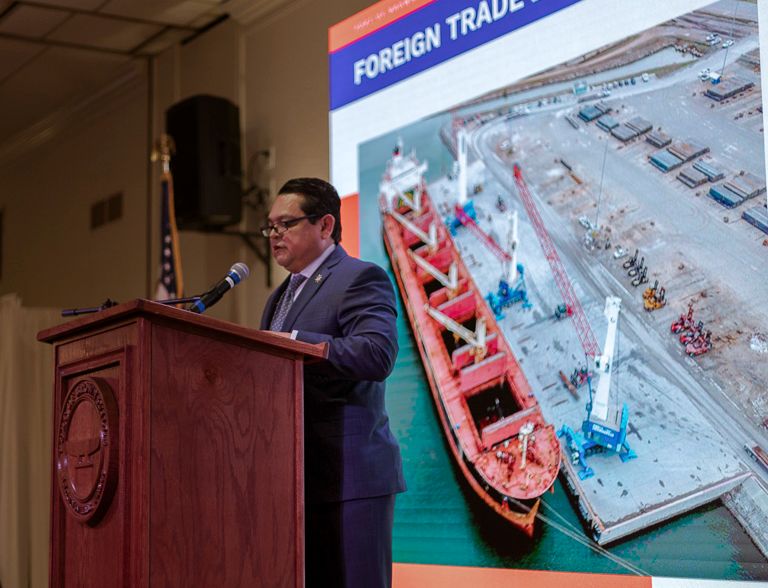- Fragile Planet Offers a Nighttime Wildlife Experience
- Falcons Soccer Off & Running
- Cameron County Receives Funds to Improve Two Parks
- Falcons Complete First Half of 32-6A
- School District to Help out Victims of California Wildfires
- Sand Castle Days Continued Despite Unexpected Weather
- Ready for District
- Discussion of Garbage Dumpster Rates, Agreements Between State & City on Highway Regulations, and More
- 31st Annual Shrimp Cook-Off is Right Around the Corner
- LFHS Cross Country
2022 State of the Port Address
- Updated: April 9, 2022
Continued Progress at the Port of Brownsville Provides Positive Outlook for the RGV Economy

BROWNSVILLE, Texas – March 24, 2022 —The Port of Brownsville remains a stronghold for the Rio Grande Valley’s economy providing record-setting tonnage and robust operating revenues for FY 2021.
Brownsville Navigation District Board Chairman Sergio Tito Lopez highlighted these achievements at the 2022 State of the Port Address held today at the Rancho Viejo Convention Center in Rancho Viejo, TX.
The unaudited operating revenues for FY 2021 surpassed the $30 million mark for the second consecutive year at $34 million, while cargo tonnage amounted to 13.8 million tons, breaking a previous record of 11.6 million in 2020.
“The Port of Brownsville remains strong and focused on its mission. We have not only remained open for business, but we have also grown,” said Lopez. “As vessels continue to bring more cargo, more jobs are created and sustained. We continue to invest in the port to attract new industries and support economic stability to ensure good-paying jobs.”
Dr. M. Ray Perryman, economist, President and CEO of the Perryman Group, was the keynote speaker at the event attended by port stakeholders, members of the business community and local leadership. Dr. Perryman provided an economic forecast for the Port of Brownsville and the Rio Grande Valley.
For the ninth consecutive year, the port’s Foreign Trade Zone No. 62 ranked in the top three out of 193 FTZs in the nation for the value of exports, according to the U.S. Foreign Trade Zones Board’s Annual Report to Congress. Additionally, FTZ No. 62 ranked 21st nationally for the value of imports totaling more than $3 billion. This increased activity at the port across its diverse businesses tested its logistical capabilities and provided favorable results.
Multimodal services at the port provided the smooth transportation of commodities to service a wide range of industries in the U.S. and Mexico. Vessel traffic through the Brownsville Ship Channel increased by 11 percent. Throughout 2020, 1,671 vessels called on the port, and in 2021 that number increased to 1,855. The Brownsville and Rio Grande International Railroad, operated by OmniTRAX, ended 2021 with an all-time high of 65,865 loaded railcars handled, a 22 percent increase from 2020. Throughout 2021, the port registered 438,000 truck movements representing an average of 1,200 truck movements per day.
Among the industries at the port, wind energy components remain a mainstay, as moving nacelles, hubs, tower sections and the world’s longest windmill blades continue their route through the port to their destination. The ever-growing steel sector at the port registered a record of 4.3 million tons of steel products moved while petroleum-based commodities represented nearly 50 percent of the total cargo moved with 6.3 million tons.
Ship recycling activities continued with All-Star Metals, International Shipbreaking Ltd., and SteelCoast, the nation’s leading ship recyclers, securing a steady stream of contracts from the U.S. government and the private sector. In 2021, ISL was awarded a contract from the U.S. Navy to recycle the USS Kitty Hawk and the USS John F. Kennedy, representing the fourth and fifth aircraft carriers to be recycled by the company. The USS Kitty Hawk is currently en route to the Port of Brownsville and is expected to arrive in May.
In early March, the Port of Brownsville held a ribbon-cutting ceremony for the South Port Connector Road, the Rio Grande Valley’s newest international trade route.
“The increasing activity at the port has demonstrated that the Port of Brownsville is the economic engine for the Rio Grande Valley. In the last 8 years, we’ve invested more than $100 million in the construction and rehabilitation of docks, port facilities and equipment, utility infrastructure, roads, patios, and laydown yards,” said Lopez. “These improvements have been exclusively funded using port revenues, and not at the expense of the taxpayer.”
Growth continues at the port with a major terminal development for the efficient loading of open-top gondola railcars for steel slab shipments to Mexico and the expansion of liquid storage capacity, currently at 6.9 million barrels.



